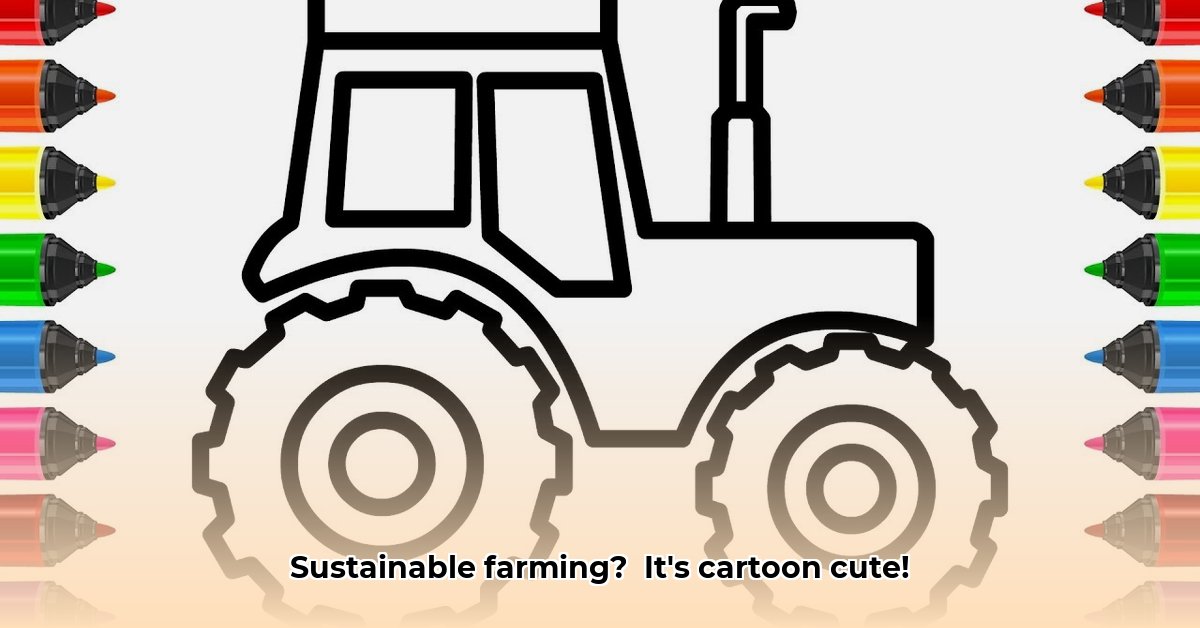
Cartoon Tractor Drawing: A Symbol of Sustainable Farming
Let's face it: farming isn't always the most glamorous profession. But what if we could change that? What if we gave the hardworking tractors, the backbone of our food system, a fun, cartoon makeover? This isn't just about aesthetics; it's about sparking excitement around sustainable farming. Our cheerful cartoon tractor isn't just cute; it symbolizes innovative, eco-friendly farming methods. It's a friendly invitation to explore this crucial topic. Isn't it time we made sustainable agriculture more appealing? For a fun DIY project, check out this chicken tractor tutorial.
The Allure of a Cartoon Tractor
A bright, cheery cartoon tractor drawing is instantly engaging. It's way more captivating than reams of agricultural data! This playful image can ignite conversations about environmentally friendly farming and resource conservation, making learning fun. It's an invitation to delve into a critically important subject.
Beyond the Cute: Sustainable Farming in Action
Our cartoon tractor represents a significant shift in agricultural thinking. It symbolizes farmer innovation and earth-conscious methods. Sustainable farming prioritizes efficiency, minimizing environmental impact while ensuring ample food production. This involves several key strategies:
Precision Farming: Using GPS-guided machinery and high-tech sensors, farmers optimize resource use. Imagine our cartoon tractor equipped with these smart tools—precisely delivering fertilizer and water, minimizing waste and maximizing yields. It's a technological upgrade for the farm! Research indicates that precision agriculture can reduce fertilizer use by up to 20%, contributing significantly to environmental sustainability.
Crop Rotation: This age-old technique maintains soil health, reduces pests, and minimizes the need for harmful chemicals. It’s a natural vitamin boost for the soil! Our happy cartoon tractor could be shown happily tending to thriving crops, demonstrating the power of crop rotation. Studies show that crop rotation can increase soil organic matter by 15-20% over time, enhancing soil fertility and reducing erosion.
Renewable Energy: Solar-powered farm equipment reduces reliance on fossil fuels, minimizing the carbon footprint. Picture our cartoon tractor with solar panels – a perfect visual of eco-friendly farming! "Solar-powered equipment is vital for reducing our carbon footprint in agriculture," says Dr. Anya Sharma, Agricultural Engineer, Stanford University. The transition to renewable energy sources is crucial for mitigating the impact of agriculture on climate change.
Integrated Pest Management (IPM): IPM emphasizes natural pest control, reducing or eliminating chemical pesticides. This could include introducing beneficial insects, using crop rotation to disrupt pest life cycles, and employing other biological controls. Our cartoon tractor might be shown happily working alongside ladybugs! While IPM may require more initial management, long-term studies indicate that it can significantly reduce pesticide use and maintain crop yields.
Water Conservation: Efficient irrigation techniques, like drip irrigation, save water and energy. Our cartoon tractor could proudly display its sophisticated irrigation setup. Recent studies show that efficient irrigation can reduce water consumption by up to 40% in many agricultural settings.
How You Can Contribute to Sustainable Agriculture
Even small actions make a big impact:
Reduce Food Waste: Every bit helps reduce the environmental impact of food production. A 2021 UN report showed that reducing food waste is crucial in mitigating climate change and improving food security.
Support Local Farmers: Buying from local farmers' markets supports sustainable practices and strengthens your community. Local farmers often prioritize sustainability due to their direct connection to the land and community.
Learn More: Educate yourself on sustainable agriculture. There are many online resources available; explore and engage.
The Benefits and Challenges of Sustainable Farming
Sustainable farming offers significant advantages but also faces challenges:
| Advantages | Disadvantages |
|---|---|
| Environmentally friendly | Higher initial investment costs |
| Healthier soils, improved biodiversity | Potential for lower yields initially |
| Enhanced long-term profitability | Requires specialized knowledge and training |
| Reduced reliance on synthetic inputs | Management of pests and diseases more complex |
The cartoon tractor is a symbol of a sustainable future. By embracing these practices, we can grow food while protecting our planet. Let's continue to explore ways to make our food system more eco-friendly.